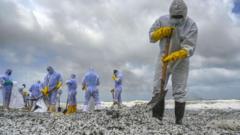In southern Vietnam, the shadows of the Vietnam War continue to cast a long and painful legacy for the victims of Agent Orange. One of those individuals, Nguyen Thi Ngoc Diem, has battled the lifelong repercussions of the toxic defoliant, which she believes has affected her due to her father's exposure while serving in the military. After decades of struggle, a glimmer of hope arrived when U.S.A.I.D. funded a project that provided her graphic design training in 2022, enabling her to secure a job.
However, that hope was abruptly placed in jeopardy as news surfaced that President Trump had frozen U.S.A.I.D. funding and planned to considerably reduce the workforce within the humanitarian agency. Ms. Diem, confined to a wheelchair, expressed her dismay over the loss of support from the very country that was behind her suffering. “It makes no sense,” she lamented, pointing out the ethical responsibility the U.S. holds towards the victims affected by its military actions.
Despite having worked hard with the skills she acquired, Diem’s situation is precarious. The closure of her company earlier this year compounded her worries. She had been expecting further assistance for a small loan or a new computer from the same program that had once bolstered her career. With her current computer a relic from 2011, its frequent crashes hinder her progress in a digital world that continually evolves.
Thus, as the U.S. shifts its focus and funding, individuals like Nguyen Thi Ngoc Diem are left in a state of uncertainty, relying on dwindling support and grappling with the ongoing challenges that stem from America’s past. The abandonment of commitments made seems to undermine the essential aid relied upon by those who still suffer as a result of the war’s toxic legacy.























